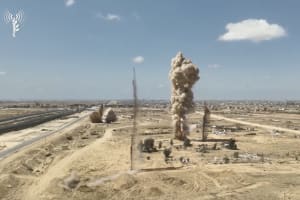IDF shifts strategy for Rafah incursion amid evacuation of one million civilians and international pressure

The Israeli military has significantly degraded the majority of Hamas forces since the war began on Oct. 7. However, the IDF reports that four operational Hamas brigades still remain, currently positioned in Rafah near the southern Gaza border with Egypt.
A Rafah incursion by Israel Defense Forces has been complicated by the presence of around 1 million Palestinian civilians in the area, which Hamas terrorists have been using as human shields.
Despite this, the IDF has successfully evacuated roughly 950.000 Gazans from the southern town over the past two weeks, beginning May 6. The majority of the remaining civilians, roughly 300,000 to 400,000 people, are concentrated in the Tel al-Sultan area near Gaza's Mediterranean Coast. Most civilians in Gaza have been evacuated to al-Muwasi, an area defined by Israel as a "protected humanitarian zone."
The Biden administration previously estimated that it would take several months to evacuate most of the civilian population out of the Rafah area. The White House has been opposed to a major IDF operation in Rafah due to the presence of many civilians. However, the reality on the ground is changing rapidly as most of the civilians have now been evacuated, according to reports.
In early May, Israeli forces captured the Rafah Crossing on the border between Gaza and Egypt. The crossing is considered strategic as it is reportedly Hamas’ only gateway to the outside world. More importantly, Hamas allegedly uses the Rafah crossing and its border tunnels to smuggle weapons and other materials to sustain its rule over the Gaza Strip.
The IDF capture of the Rafah crossing came mere days after Hamas terrorists killed four IDF soldiers and wounded 10 Israelis in a rocket barrage against the Keren Shalom border crossing, which Israel had reopened to further facilitate the inflow of humanitarian aid to Gaza.
The Israeli military reportedly controls about 30% of Rafah, as well as most of the Philadelphi Corridor, a strategically important narrow strip of land that separates Gaza from Egypt. By controlling this area, Israel can now more effectively prevent Hamas from smuggling weapons into the coastal enclave.
According to an article by political analyst David Ignatius in The Washington Post, published on Monday, Israel has reportedly canceled its planned major operation in Rafah due to international pressure. Instead, the Israeli military will initiate a more limited operation with two IDF divisions, which will likely encounter less opposition from the Biden administration.
The Biden administration has repeatedly urged the Israeli government to present a viable post-war plan for Gaza. However, Prime Minister Benjamin Netanyahu has been reluctant to discuss any proposal for Gaza's future, reportedly due to opposition from far-right members of his government.
Ignatius also asserts that unnamed Israeli defense officials have, in principle, agreed to the U.S.-proposed plan for Gaza post-war.
“[It] will include a Palestinian security force drawn in part from the Palestinian Authority’s administrative payroll in Gaza. This Palestinian force will be overseen by a governing council of Palestinian notables, backed by moderate Arab states such as Egypt, Jordan, the United Arab Emirates and Saudi Arabia,” Ignatius wrote.
“Some Israeli officials – but not Prime Minister Benjamin Netanyahu – accept that this governing entity would have ties with the PA in Ramallah,” he added.

The All Israel News Staff is a team of journalists in Israel.
You might also like to read this:














